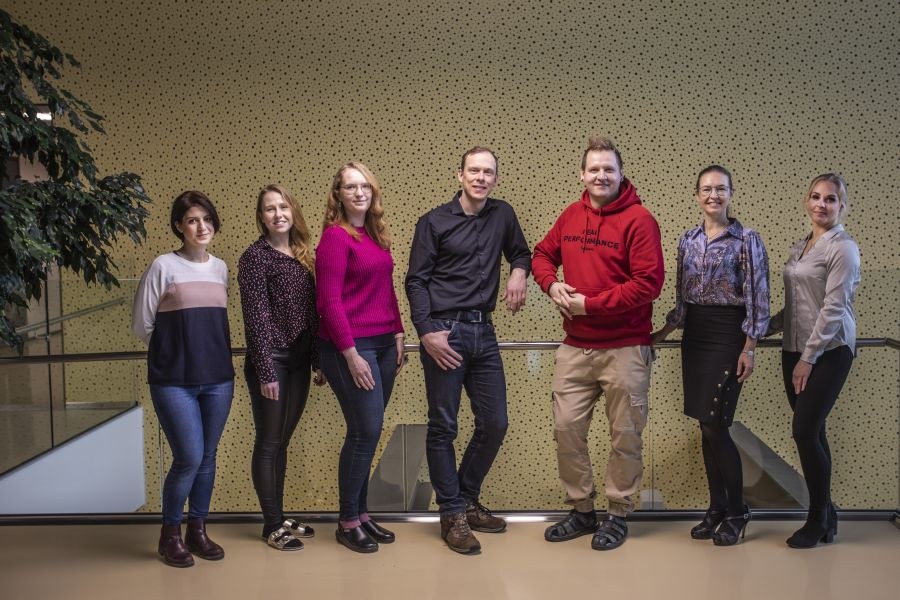Professor Arri Priimägi receives ERC Proof of Concept grant to develop dynamic and light-responsive cell culture platforms

Cell culture dishes have for long been important tools for the study of biomedicine and, in particular, dynamic cellular processes. The problem with them is that cell cultures grown in a conventional petri dish are static, unlike biological tissues, and therefore do not accurately mimic cells’ natural environment.
The L-Cell project is a joint undertaking between Arri Priimägi’s Smart Photonic Materials group and Academy Research Fellow Teemu Ihalainen to develop dynamic cell culture platforms that can be controlled and modulated with light. These platforms hold promise to facilitate drug development, disease modelling and the study of cell physiology.
“The surface topography of the material we are developing can be precisely manipulated with light. Our earlier studies have demonstrated that, for example, the growth and collective movement of epithelial cells and the direction of neuronal axons can be controlled by manipulating the light-induced surface patterns,” Priimägi says.
Priimägi believes that dynamic cell culture platforms would benefit, for example, pharmaceutical companies and bioscientists in universities and research institutions.
“We have identified collaboration opportunities with companies that develop new solutions for modelling the natural cellular environment. For example, the protein micropatterning technology for coating cell culture substrates, which has been developed by our project partner Alvéole, can be combined with our light-responsive coating. In addition to Alvéole, Orion Pharma has an advisory role in our project,” Priimägi says.
Refining the technology and analysing market potential with ERC funding
According to Arri Priimägi, the progress with developing the technology has been rapid owing to the close collaboration between researchers across Tampere University in the past few years. The ABioT research team comprises Academy Research Fellows Teemu Ihalainen and Soile Nymark, Academy Postdoctoral Researcher Elina Mäntylä and Doctoral Researcher Heidi Peussa from the Faculty of Medicine and Health Technology and Postdoctoral Research Fellow Chiara Fedele and Doctoral Researcher Mari Isomäki from the Faculty of Engineering and Natural Sciences.
With ERC funding, Priimägi’s group will not only develop the concept further but also explore the market potential for dynamic cell culture platforms.
“A large part of the funding will go to refining and validating the concept for different cell lines. A sizeable portion will also be set aside for conducting a market analysis, building contacts with companies and creating a possible commercialisation strategy.”
Priimägi is grateful that ERC has faith in his group’s research ideas. Without external funding, their research would quickly come to a halt. Priimägi gives special praise to Chiara Fedele, who plays a key role in the operative part of the project.
“For years, she has been building bridges between engineering and medicine and looking for potential application areas for light-controlled materials in the fields of cell biology and biomaterials science. It is likely that the Smart Photonic Materials group would not be involved in cell studies without Chiara’s contribution,” Priimägi compliments his colleague.

ERC Proof of Concept grant for refining the technology
The L-Cell project has received €150,000 of ERC funding. The Proof of Concept grant is spread over 12 months. The research and market data collected during the grant period will determine the next steps for developing the concept.
The L-Cell project is a continuation of an earlier photonics-related project PHOTOTUNE, which received an ERC Starting Grant in 2016–2021 and achieved important results in the development of tunable photonic structures and light-driven soft robots. The project resulted in the development of a new concept for sensing environmental humidity using light-responsive materials, which subsequently also received an ERC Proof of Concept grant. This concept, called OPTOSENSE, is now being developed further with funding from Business Finland.
“Now we have set our sights on applying the results achieved during the PHOTOTUNE project in the field of biosciences. PHOTOTUNE is an excellent example of a project that was carried out to advance fundamental research, yet it has opened up new opportunities across disciplinary boundaries,” Priimägi notes.
The L-Cell project is funded by the European Research Council (ERC) that awards grants to outstanding scientists who pursue frontier research. ERC Proof of Concept grants are only open to current or recent ERC grant holders to explore the commercial or societal potential of their ERC-funded research. ERC funding has been awarded to 11 researchers at Tampere University since 2015.
Read more about the ERC Proof of Concept grants.
Further information
Professor Arri Priimägi
+358 44 515 0300
arri.priimagi [at] tuni.fi







